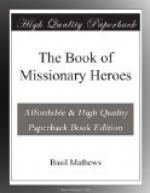Ruatoka stood up at once and reached for his lantern, and turning to the men said:
“Come and guide me to the place.”
They said, “No, we are afraid of the demon spirit. It is night. The man will die. We are afraid of the spirits. We will not go.”
Ruatoka’s father had told him when he was a boy how his own people in the years before had dreaded the spirit-demons of Mangaia, but that he must learn that there were no spirits to be dreaded; that one great Father-Spirit ruled above all, and would take care of His children, and that all those children must love one another.
So Rua, as they called him, knowing that the white man who lay sick by the roadside in the night, though of another colour, was yet a brother, and knowing that no demon spirit could harm him in the dark, lighted his lantern, poured water into a bottle, took a long piece of cloth, folded it up, and started out under the stars.
He walked for mile after mile up steep hills and down into valleys along the path; but nothing did he hear save the cry of a night bird. At last he had gone five miles, and was wondering whether he could ever find the sick man (for the long grass towered up on either side and all was still), when he heard a low moaning. Listening intently he found the direction of the sound, and then moved towards it. He found there, at the side of the path, a white man named Neville, nearly dead. He was moaning with the pain of the fever, yet unconscious.
Taking his bottle, Ruatoka poured a little water down the throat of the man. He then took the long piece of cloth, wound it round Neville, took the two ends in his hands, and stooping, he pulled and strained with all his great strength, until at last Neville lay like a sack upon his shoulders. Staggering along, Ruatoka climbed the hills that rose 300 feet high. Again and again he was bound to rest, for the man on his shoulders was as heavy as Ruatoka himself. He tottered down the hill path, and at last, just as the first light of dawn was breaking over the eastern hills, Ruatoka staggered into his home, laid the sick man upon the only bed he had, and then himself laid down upon the floor, wearied almost to death. There he slept while his wife nursed and tended the fever-stricken Neville back to life.
* * * * *
Over a thousand years before that day Wilfrid[43] had brought life and joy to the starving Saxons of the South coast of England. A hundred years before that day white men, the great-great-grandchildren of those Saxons, had started out in The Duff and, sailing across the world, had taken life and joy in the place of the terror of demons and the death by the club to the men of the Islands of the Seas.
Now Ruatoka, the South Sea islander, having in his heart the same brave spirit of the Good Shepherd—that spirit of the Good Samaritan, of help and preparedness, of courage and of chivalry, had carried life and joy back to the North Sea islander, the Briton who had fallen by the roadside in Papua.




